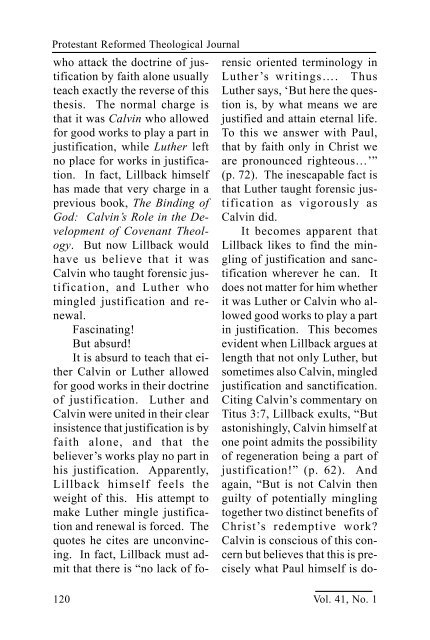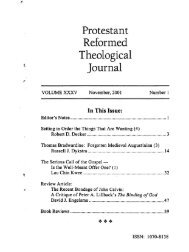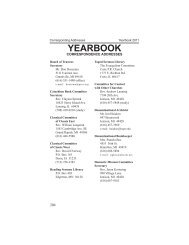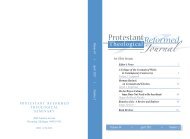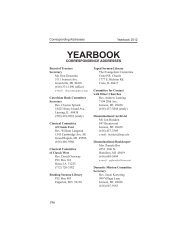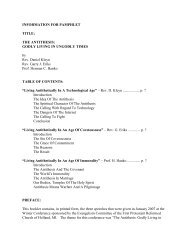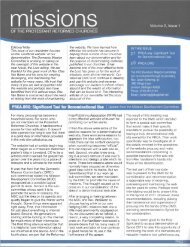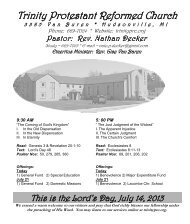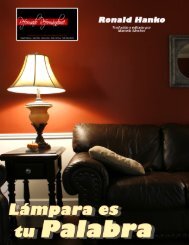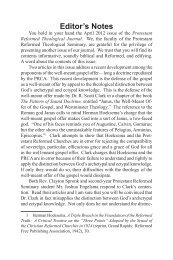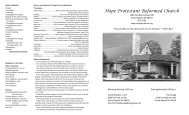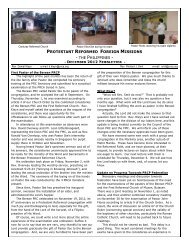November 2007 - Protestant Reformed Churches in America
November 2007 - Protestant Reformed Churches in America
November 2007 - Protestant Reformed Churches in America
You also want an ePaper? Increase the reach of your titles
YUMPU automatically turns print PDFs into web optimized ePapers that Google loves.
<strong>Protestant</strong> <strong>Reformed</strong> Theological Journal<br />
who attack the doctr<strong>in</strong>e of justification<br />
by faith alone usually<br />
teach exactly the reverse of this<br />
thesis. The normal charge is<br />
that it was Calv<strong>in</strong> who allowed<br />
for good works to play a part <strong>in</strong><br />
justification, while Luther left<br />
no place for works <strong>in</strong> justification.<br />
In fact, Lillback himself<br />
has made that very charge <strong>in</strong> a<br />
previous book, The B<strong>in</strong>d<strong>in</strong>g of<br />
God: Calv<strong>in</strong>’s Role <strong>in</strong> the Development<br />
of Covenant Theology.<br />
But now Lillback would<br />
have us believe that it was<br />
Calv<strong>in</strong> who taught forensic justification,<br />
and Luther who<br />
m<strong>in</strong>gled justification and renewal.<br />
Fasc<strong>in</strong>at<strong>in</strong>g!<br />
But absurd!<br />
It is absurd to teach that either<br />
Calv<strong>in</strong> or Luther allowed<br />
for good works <strong>in</strong> their doctr<strong>in</strong>e<br />
of justification. Luther and<br />
Calv<strong>in</strong> were united <strong>in</strong> their clear<br />
<strong>in</strong>sistence that justification is by<br />
faith alone, and that the<br />
believer’s works play no part <strong>in</strong><br />
his justification. Apparently,<br />
Lillback himself feels the<br />
weight of this. His attempt to<br />
make Luther m<strong>in</strong>gle justification<br />
and renewal is forced. The<br />
quotes he cites are unconv<strong>in</strong>c<strong>in</strong>g.<br />
In fact, Lillback must admit<br />
that there is “no lack of forensic<br />
oriented term<strong>in</strong>ology <strong>in</strong><br />
Luther’s writ<strong>in</strong>gs…. Thus<br />
Luther says, ‘But here the question<br />
is, by what means we are<br />
justified and atta<strong>in</strong> eternal life.<br />
To this we answer with Paul,<br />
that by faith only <strong>in</strong> Christ we<br />
are pronounced righteous…’”<br />
(p. 72). The <strong>in</strong>escapable fact is<br />
that Luther taught forensic justification<br />
as vigorously as<br />
Calv<strong>in</strong> did.<br />
It becomes apparent that<br />
Lillback likes to f<strong>in</strong>d the m<strong>in</strong>gl<strong>in</strong>g<br />
of justification and sanctification<br />
wherever he can. It<br />
does not matter for him whether<br />
it was Luther or Calv<strong>in</strong> who allowed<br />
good works to play a part<br />
<strong>in</strong> justification. This becomes<br />
evident when Lillback argues at<br />
length that not only Luther, but<br />
sometimes also Calv<strong>in</strong>, m<strong>in</strong>gled<br />
justification and sanctification.<br />
Cit<strong>in</strong>g Calv<strong>in</strong>’s commentary on<br />
Titus 3:7, Lillback exults, “But<br />
astonish<strong>in</strong>gly, Calv<strong>in</strong> himself at<br />
one po<strong>in</strong>t admits the possibility<br />
of regeneration be<strong>in</strong>g a part of<br />
justification!” (p. 62). And<br />
aga<strong>in</strong>, “But is not Calv<strong>in</strong> then<br />
guilty of potentially m<strong>in</strong>gl<strong>in</strong>g<br />
together two dist<strong>in</strong>ct benefits of<br />
Christ’s redemptive work<br />
Calv<strong>in</strong> is conscious of this concern<br />
but believes that this is precisely<br />
what Paul himself is do-<br />
120<br />
Vol. 41, No. 1


